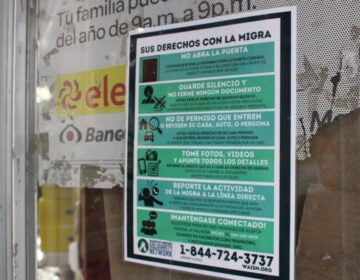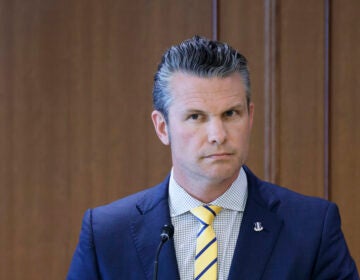Reforms help boost N.J. to higher ethical ground
With more than 100 public officials arrested in the past decade, many think New Jersey is the most corrupt state in the nation.
So you may be surprised that a months-long investigation by the Center for Public Integrity says the Garden State has the best laws and regulations to prevent corruption.
No state got an A, but New Jersey’s B+ is the best score.
That top grade means years of toil were worth it, said Heather Taylor, of the Citizens Campaign, a good government group.
“Over the last 10 years we’ve seen significant government reform at all levels of government,” Taylor said. “The Legislature put in a series of reforms that really created strong conflict of interest rules, public disclosure and anti-nepotism rules to really give confidence back to the voters that New Jersey is operating property.”
In recent years, Newark Mayor Sharpe James, Camden Mayor Milton Milan and state Sen. Wayne Bryant, to name a few, have gone to federal prison as the U.S. Attorney’s office racked up conviction after conviction.
To counteract that climate of corruption, state lawmakers have passed several reforms including banning politicians from holding multiple elected offices and restricting political donations by government contractors — the “pay to play” law.
New Jersey Election Law Enforcement Commission executive director Jeff Brindle doesn’t believe New Jersey is more corrupt than many other states. He says there’s just been increased attention because of all the efforts to deal with it.
“Any contribution particularly on the state level that is over $300, that would disqualify individuals from receiving a public contract,” Brindle said. “So that really kind of eliminates the whole idea of a quid pro quo for a contribution for a contract.”
Loopholes remain
Despite the progress new Jersey has made, advocates for increased government transparency say there’s more to be done.
“People can give to PACs,” points out former state Sen. Bill Schluter, now the vice chairman of the State Ethics Commission. “People can give directly to candidates and it’s not covered by ‘pay to play.’ And there are kinds of government decisions that are made that are not subject to pay to play, zoning decisions and things like that.”
Schluter said he’d like to require lobbyists to file reports connecting the legislation they try to sway to the information they already disclose on who is paying them.
“It should be noted because these people, lobbyists, are very influential. They’re big campaign contributors and they’re very influential on the political scene,” he said.
New Jersey scored well because of its Open Public Records Act, but John Paff said that law doesn’t go far enough. Paff, the chairman of New Jersey Libertarian Party’s open government advocacy project, said he’s filed hundreds of requests for information under OPRA.
Paff said there are too many exemptions. And even though a citizen can appeal when denied access to a record, he said the Government Records Council moves far too slowly.
“It’s taking them like 18 months or two years to adjudicate a complaint,” Paff said. “So that’s an issue because by the time you get the record, even if you prevail, a lot of times whatever it is that you were trying to prove in the first place or whatever case you were trying to make has expired and no longer has any relevance.”
Enforcement is another issue
The Citizens Campaign’s Taylor said New Jersey could improve its score by enforcing its 30-year-old Open Public Meetings Act.
“We should really be looking at how we can make sure that local government bodies are abiding by the open public meetings law,” Taylor said. “In today’s age, people can send emails, they can meet in secret, so it’s really important to bring that up to date.”
Taylor also said more transparency is needed on how local governments spend their money
“There’s a lot of towns that don’t even have websites, that aren’t tracking what their budgets are, what their vouchers are, what their bills are,” she said. “So we really need to just embrace the 21st century and use the Internet to keep citizens informed and engaged. Then they themselves can be better watchdogs in their local community.”
Senate Majority Leader Loretta Weinberg, D-Bergen, who has sponsored legislation to update OPRA and the Opens Public Meetings Act, agrees there is more to be done to improve government ethics and transparency.
So, even the state at the head of the class has a little homework still to do.
WHYY is your source for fact-based, in-depth journalism and information. As a nonprofit organization, we rely on financial support from readers like you. Please give today.




